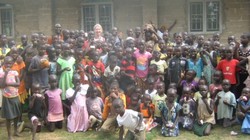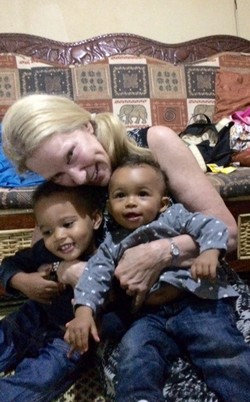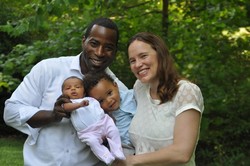A letter from Nancy Smith-Mather serving in South Sudan
APRIL 2015 – IMPRESSIONS FROM MAMA LOU
My mother came to visit us. This was a very big deal for us and for our friends and colleagues in Yei. People were very excited, especially our 2-year-old son who loves “Mama Lou” dearly. Mom met us in Uganda for a week’s retreat, which turned into a week and a half when Shelvis needed some unexpected medical treatment. He is doing much better now.

Mama Lou loved singing with the Sunday School children on Easter
Then it was time to head to Yei. All of the scary news about South Sudan swirled in my mother’s mind, but she got on that little plane and rode with her grandson in her lap to our small dirt airstrip. A colleague picked us up from the two-room, no-bathroom airport. We picked up a few things in town on the way, and then she walked into our home, iPhone in hand, doing a video panorama of our house, “and this is where they live,” she said.
When she said those words, I immediately thought of all the “reporting” she would do for friends and family members upon her return to the U.S. I am sure they sent her with a mission to see what things are like in South Sudan. I was curious to know what my mom was thinking throughout her visit, but I tried to refrain from too many questions until she returned home and was able to reflect a bit. A week after returning home I called to ask, and she responded:
“I came home so emotionally affected,” she said. “While I was there, I had to fight my own emotions about how hard some things were for you and your family on a day-to-day basis: the fact that you can’t keep things in the fridge for very long because the power goes out at night, the way you make all of Addie’s baby food—but then I looked over, and the people living next to you are in mud huts. Then, I thought—you have so much… I had to dig deep to realize our faith is not about comfort or things.”

She came a long way to give grandkids hugs
She then reflected on the way people in South Sudan love holding and playing with babies, even a stranger’s baby. “So many people want to hold Addie,” she said. “At first I thought about the problem with germs caused by so many hands holding a baby. But then I thought, Addie is being loved by so many people, and the relationships are more important than the germs. My baby granddaughter is happy to be with anybody; what is better than that?”
She then added another observation: “The desire to make a visitor feel welcome is so prevalent there.” During Mama Lou’s stay, RECONCILE held a special dinner to welcome her to South Sudan. Goat, fish, and French fries were among the foods served at the large feast, during which all of the RECONCILE Peace Institute (RPI) students introduced themselves and welcomed her. At dinner my mother sat next to RPI visiting instructor, Canon John Kanyikwa. When reflecting on their dinner discussion, she said:
“I was so touched to hear the passion he has for his country, and how disappointed he is with what has happened (referring to the country’s recent fall back into civil war). I was inspired by his commitment to helping the country heal.”
The reflections continued. She needed to share and process her experiences, and I was grateful she let me listen. She talked about several things: the South Sudanese children’s angelic voices, their contagious smiles, the wonder that they sat still for four hours in church (not including Jordan), personal fear at being surrounded by so much poverty, amazement that Jordan is accustomed to walking long distances…
Before the phone cut off a second and final time in our conversation, she said: “When people ask me about my trip, I say, ‘It was an amazing trip, to see the way you live, the lifestyle you are now accustomed to; it is a hard life. At the same time, to know that God has led you to that place and you are helping people heal from incredible violence and pain—who can question that? Nobody.’ ”
We loved our time with Mama Lou. So much so, I was afraid Jordan would have a hard time saying “goodbye” to his grandmother when she left. Initially it seemed the farewell was going smoothly. We waved “Bye-bye” to Mama Lou as she climbed the two-step ladder into the little plane. We watched the aircraft roll away. We chased it a bit as it picked up speed, then watched it soar into the sky. When it was out of sight, I started walking back to the car; then I heard a high-pitched scream. I turned around to see a small boy, tears streaming down his face, shouting between sobs, “I don’t want the airplane to leave. I don’t want it to leave!!!” He refused to be comforted. At first I was not sure if he was upset that the plane was gone, or his grandmother. Halfway back to town, though, he stopped crying long enough to say, “I don’t want Mama Lou to go.”
“I don’t either.”
Thank you for your prayers and support that allow us to serve God in South Sudan. Being far from family is the most difficult part of this calling, yet we thank God that my mother could see and relay to our family members that we are ok, we are in the right place, and there are many wonderful people here who love and care for our family. We feel incredibly blessed.
Nancy
The 2015 Presbyterian Mission Yearbook for Prayer & Study, p. 139
Read more about Shelvis and Nancy’s ministry

Rev. Shelvis and Rev. Nancy Smith-Mather
Mission co-workers in South Sudan since 2011
Serving withRECONCILE International
Give to Shelvis and Nancy’s MinistryDownload Shelvis and Nancy’s prayer card
Contact: Shelvis Smith-Mather
(shelvis.smith-mather@pcusa.org)
Contact: Nancy Smith-Mather
(nancy.smith-mather@pcusa.org)
Nancy and Shelvis periodically visit the US and are available to speak as their schedule permits. Email them to extend an invitation to visit your congregation or organization.
Shelvis and Nancy Smith-Mather work with RECONCILE, (Resource Centre for Civil Leadership), an indigenous ecumenical Christian organization, which was established in March 2004 by a national church council of the New Sudan Council of Churches. It promotes “peace building” by providing training in trauma recovery, conflict transformation, and civic education. RECONCILE’s activities are in areas of high inter-ethnic conflict, with the churches often being the typical point of entry into these communities. Shelvis and Nancy participate in RECONCILE’s training events that address inter-ethnic conflict. Shelvis serves as the principal of the RECONCILE Peace Institute, which offers three-month courses in community-based trauma healing as well as peace studies and conflict transformation.